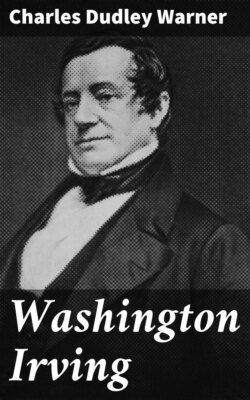Washington Irving

Реклама. ООО «ЛитРес», ИНН: 7719571260.
Оглавление
Charles Dudley Warner. Washington Irving
Washington Irving
Table of Contents
EDITOR'S NOTE
WASHINGTON IRVING
I. PRELIMINARY
II. BOYHOOD
III. MANHOOD—FIRST VISIT TO EUROPE
IV. SOCIETY AND “SALMAGUNDI”
V. THE KNICKERBOCKER PERIOD
VI. LIFE IN EUROPE—LITERARY ACTIVITY
VII. IN SPAIN
VIII. RETURN TO AMERICA—SUNNYSIDE—THE MISSION TO MADRID
IX. THE CHARACTERISTIC WORKS
X. LAST YEARS—THE CHARACTER OF HIS LITERATURE
Отрывок из книги
Charles Dudley Warner
Published by Good Press, 2019
.....
The advent of Cooper, Bryant, and Halleck was some twenty years after the recognition of Irving; but thereafter the stars thicken in our literary sky, and when in 1832 Irving returned from his long sojourn in Europe, he found an immense advance in fiction, poetry, and historical composition. American literature was not only born—it was able to go alone. We are not likely to overestimate the stimulus to this movement given by Irving's example, and by his success abroad. His leadership is recognized in the respectful attitude towards him of all his contemporaries in America. And the cordiality with which he gave help whenever it was asked, and his eagerness to acknowledge merit in others, secured him the affection of all the literary class, which is popularly supposed to have a rare appreciation of the defects of fellow craftsmen.
The period from 1830 to 1860 was that of our greatest purely literary achievement, and, indeed, most of the greater names of to-day were familiar before 1850. Conspicuous exceptions are Motley and Parkman and a few belles-lettres writers, whose novels and stories mark a distinct literary transition since the War of the Rebellion. In the period from 1845 to 1860, there was a singular development of sentimentalism; it had been, growing before, it did not altogether disappear at the time named, and it was so conspicuous that this may properly be called the sentimental era in our literature. The causes of it, and its relation to our changing national character, are worthy the study of the historian. In politics, the discussion of constitutional questions, of tariffs and finance, had given way to moral agitations. Every political movement was determined by its relation to slavery. Eccentricities of all sorts were developed. It was the era of “transcendentalism” in New England, of “come-outers” there and elsewhere, of communistic experiments, of reform notions about marriage, about woman's dress, about diet; through the open door of abolitionism women appeared upon its platform, demanding a various emancipation; the agitation for total abstinence from intoxicating drinks got under full headway, urged on moral rather than on the statistical and scientific grounds of to-day; reformed drunkards went about from town to town depicting to applauding audiences the horrors of delirium tremens—one of these peripatetics led about with him a goat, perhaps as a scapegoat and sin-offering; tobacco was as odious as rum; and I remember that George Thompson, the eloquent apostle of emancipation, during his tour in this country, when on one occasion he was the cynosure of a protracted anti-slavery meeting at Peterboro, the home of Gerrit Smith, deeply offended some of his co-workers, and lost the admiration of many of his admirers, the maiden devotees of green tea, by his use of snuff. To “lift up the voice” and wear long hair were signs of devotion to a purpose.
.....